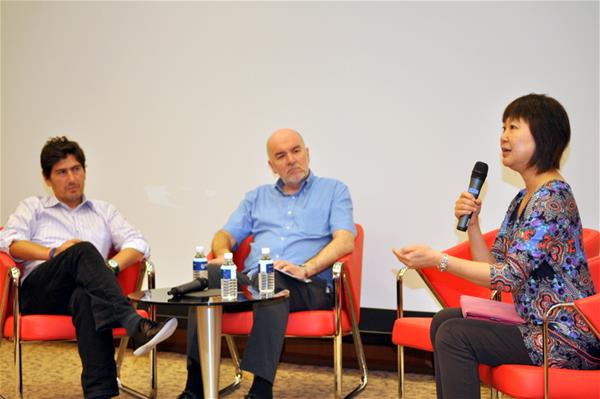How do we spot the Next Big Thing in a rapidly changing economy where the latest technological trend can totally transform the way business is done?
At a recent Thought Leadership seminar New Digital Economy: Challenges and Opportunities by ISS, discussions centred around how digital technology rapidly changing industry and services, and suggestions were presented on how individuals and organisations could arm themselves with the knowledge and skills to adapt.

(from left) Epirot Ludvik Nekaj, Founder & CEO of Crowdsourcing Week; Peter Harwood, Chief Conciliator HM Government UK, ACAS and Prof Irene Ng,Professor of Marketing and Service Systems at University of Warwick, UK
The seminar had experts from different industries offering their perspective to help individuals and organisations cope with this new digital landscape.
Stuart Smith, the Deputy Chief of Service Innovation at ISS, kicked off the seminar with the observation that people have difficulty envisioning the future. He opined that in a world where cycles of technological disruption are materially faster and broader, people often underestimate the effects of change. He pointed out how the Encyclopaedia Britannica - a venerable, 242-year-old institution - was driven out of print in 2010.
Indeed, how mentally ready are we to engage in a digital world where everything is interconnected?
Peter Harwood, Chief Conciliator, HM Government, ACAS (an independent British organisation that mitigates disputes in the workplace), put forth this perspective: With the ‘hyper-connected’ digital economy, transparency has become a concern.
As our personal lives become increasingly digitised through the use of social networks, the line between what is private, and work related has become increasingly blurred to the extent that seemingly casual remarks posted by employees on their private social network have led to dismissals by their employers. Information is so readily available now that every individual carries a digital history which can be traced online. With social media melting away traditional boundaries and structures in the workplace, executives, management and staff today need to be educated on how to handle new sensibilities.
Indeed, the extent to which digital technology has penetrated our lives is astounding. The mobile smartphone, the new media for connectivity, has become something we cannot do without. Professor Irene Ng, Professor of Marketing and Service Systems at University of Warwick, UK, expounded: “Connectivity is the new driver for wealth in the next five to 10 years”.
Professor Ng said that in order to survive in the new digital economy, companies need to think beyond the material context of a physical product to consider how value could be provided to a user through digital services. The services have to be centered around a consumer’s lifestyle, and be useful in the context of a particular activity.
Mapping the ecology of consumers and service provision verticals into a Value Constellation Map, Professor Ng demonstrated that new markets were created by novice lean players competing for market shares in someone else’s pie. In order to compete, these players had to generate new market models that disrupt traditional markets and their providers.
Indeed, many new businesses and ‘soloprenuers’ had been bred from this crucible of possibilities, observed Epirot Ludvik Nekaj, Founder and CEO of Crowdsourcing Week. Open platforms, formed by a combination of stable communications infrastructure, easy availability of mobile widgets and low barriers to entry, pave the way for millions of people to collaborate.
Today, companies are sensitive to the opinions of their customers and are open to using their ideas to innovate services in an activity known as crowdsourcing. As the market becomes more open, anyone with relevant skills can seek to profit. Nejak pointed out that the top three Indian performers on a freelancing website, Elance, took home a whooping total of US$17 million.
If you are interested in attending the next Service Innovation Seminar, please write in to issmarketing@nus.edu.sg or visit our event page.